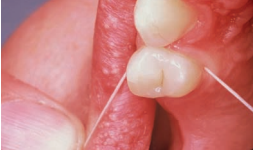On Friday, November 11th, 2016 the team of Britten Periodontics & Implant Dentistry in Clearwater, FL gathered together to provide compassionate, comprehensive dental care to deserving veterans. “There was something really special about coming into work today. It was just so rewarding knowing that the office is filled with veterans and we are doing something great for them,” one dental hygienist stated. Dr. Britten reflected that one of the patients who made a lasting impression on him was a young lady that served in the Marine Corps in Afghanistan. This veteran’s armored transport unit had been hit with an explosive that left her with a traumatic brain injury. “She was so proud of her Marine’s tattoo and showed me a photo of herself in action before the accident. I could tell she was a Marine for life, right down to the bone. It made me proud that we have men and women serving us that are so dedicated.”
This is the 2nd annual Free Dental Day Dr. Todd M. Britten has organized in his Clearwater, Florida periodontal practice. A little over two years ago, Britten and his team were brainstorming ways to give back to the community. Britten stated, “Our veterans and their families have made so many sacrifices for our freedoms and I wanted to find a way that we could give something back. Offering a day of dental work is the least we could do.”
After Dr. Britten and his team decided to plan the event, it was full steam ahead. One member of the Britten Periodontics staff, Ellen Byrd, helped find patients in need and organized the event. Byrd, a dental hygienist, reached out to local dentists and organizations such as the Community Dental Clinic to find patients in need of periodontal care. Dr. Britten stated, “Ellen really stepped up. She got the word out about what we were doing and was able to find an incredible group of vets both last year and this year that were in need of periodontal treatment. We wouldn’t be able to do what we are doing without all of her hard work.”
“Dr. Britten and his staff were amazing. They put compassion over cost when it came to helping us out. I am so grateful.”
Dr. Britten’s dental specialty, periodontics, often involves managing and treating advanced gum disease. A periodontist is often able to help a patient in danger of losing teeth or with active oral infection to turn their health around. The staff at Britten Periodontics expressed that if they could find Veterans in need of periodontal care they could improve their quality of life. “Most of the time, periodontal disease is not painful until it gets to be very advanced. Some of the veterans had been dealing with painful teeth for a long time,” Dr. Britten expressed his concern. “Even though we had to remove some teeth I felt better knowing these veterans do not have to be in discomfort anymore.”
The majority of the surgical and non-surgical dental procedures were performed on November 11th, however there was significant pre-operative work involved. This included new patient exams, dental x-rays, medical history reviews, even post-operative care. Dr. Britten performed the same comprehensive exam that he would for anyone under his care. He wanted it to be a very personal compassionate experience for these veterans. Dr. Britten stated, “It was a priority to make sure they were comfortable with us. Many of our veteran patients have dental phobias and are suffering from post-traumatic stress disorder so we needed to take the time, go the extra mile and treat them with the utmost respect.”
Veteran Chuck Pankow, one of the veterans referred by a local dentist said, “From the moment I walked in I have been treated so well. This has been a really great experience.” Another Veteran, Chris Bode, referred by the Community Dental Clinic in Clearwater, was also pleased with his care, “Dr. Britten and his staff were amazing. They put compassion over cost when it came to helping us out. I am so grateful.”
Britten Periodontics & Implant dentistry has provided over $25,000 worth of dental treatment these past two years. One of the best parts about this event is that it has already started to gain more participation in just its second year. The team members and dentists (Dr. Matthew Burton, Dr. Nolan Allen, Dr. James Hayslett, and Dr. Keith Kiskaddon) of Clearwater Dental Associates were happy to partner with Britten Periodontics to provide general dentistry for as many veterans as they could. Dr. Britten stated he and his staff were honored to hear that Clearwater Dental wanted to join in this cause. Their hope is that with each year this event will grow and be able to help more veterans. Nearly 95% of veterans are without dental coverage, making this a serious need in our community.
Britten Periodontics & Implant Dentistry is a periodontal practice offering patients personalized dental care in implant dentistry in Clearwater, Florida. Dr. Todd Britten received his Bachelor of Science & Doctorate of Dental Surgery from University of Florida, a Master’s Degree and Certificate in Periodontology and Implant Dentistry; and completed extensive training at the Institute of Advanced Laser Dentistry. He is one of the only board-certified periodontists in Pinellas County. He is a member of the American Academy of Periodontology, American Dental Association, Florida Association of Periodontists, Upper Pinellas County Dental Association, Hillsborough County Dental Association, Hillsborough County Dental Research Association and Florida West Coast Dental Association.
To learn more about Dr. Britten and his dental services visit his website at http://www.brittenperio.com or call (727) 586-2681.














